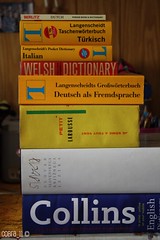January 28, 2010
Gruesome Tongue Twisters
What's the world's most throat-chokingly difficult language? Here's a worthy contender:

On balance The Economist would go for Tuyuca, of the eastern Amazon. It has a sound system with simple consonants and a few nasal vowels, so is not as hard to speak as Ubykh or !Xóõ. Like Turkish, it is heavily agglutinating, so that one word, hóabãsiriga means “I do not know how to write.” Like Kwaio, it has two words for “we,” inclusive and exclusive. The noun classes (genders) in Tuyuca’s language family (including close relatives) have been estimated at between 50 and 140. Some are rare, such as “bark that does not cling closely to a tree,” which can be extended to things such as baggy trousers, or wet plywood that has begun to peel apart.I'm convinced! The piece also argues that, contrary to popular belief, English is a relatively easy language to learn: "verbs hardly conjugate; nouns pluralise easily (just add 's', mostly) and there are no genders to remember."
Most fascinating is a feature that would make any journalist tremble. Tuyuca requires verb-endings on statements to show how the speaker knows something. Diga ape-wi means that "the boy played soccer (I know because I saw him)," while diga ape-hiyi means "the boy played soccer (I assume)." English can provide such information, but for Tuyuca that is an obligatory ending on the verb. Evidential languages force speakers to think hard about how they learned what they say they know.
That may all be true, but figuring out how to spell words in English can be a nightmare; I do believe this is the only major language in which you can actually hold spelling bees. In Spanish, by contrast, a spelling competition would be pointless since it's trivial to write out a word once you hear it. Maybe the only other possible bee-language is French—except that French-speaking countries hold dictation contests instead, as does Poland with its "Dyktando." (These usually involve scribbling down, word for exact word, a long literary passage that's read aloud.)
Japanese, meanwhile, is a comparatively simple language to speak, but then you've got the vast jungle of different characters. I don't know if there are bees for that, but there is the Kanken, the national Kanji Aptitude Test, which tests for writing, pronunciation, and stroke order, and has twelve different levels: 10 through 3, pre-2, 2, pre-1, and 1—with 10 being the easiest and 1 the hardest. As I recall, your average well-educated native speaker should be able to pass pre-2. But level 1 is no joke—you have to know about 6,000 different kanji, and, in some years, only about 200 people in the whole country earn a passing grade. The rest, I guess, just have to mutter "hóabãsiriga."
